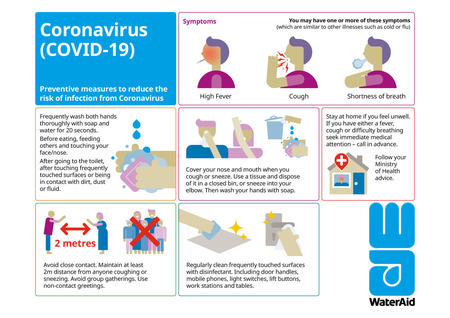Frequent handwashing with soap is one of the most effective ways to stop the spread of COVID-19.
What is COVID-19?
Coronaviruses are a group of contagious, flu-like viruses. They cause symptoms that can be as mild as a common cold but in some cases can be fatal. COVID-19 is the disease caused by a new type of coronavirus that has spread quickly around the world. Early symptoms include fever, cough and difficulty in breathing – similar to other flu-like illnesses.
Until everyone is vaccinated, preventing the spread of COVID-19 from person to person is vital to reduce the pandemic's impact on people’s lives, health, livelihoods and the healthcare systems we all rely on.
Handwashing is key to preventing coronavirus
Frequent, thorough handwashing with soap and water is one of the best ways to prevent the spread of infectious diseases, and is an important defence against COVID-19. Like a cold, coronaviruses are spread through droplets from a person coughing or sneezing, and via contaminated surfaces. Good hygiene is key to avoiding spreading it – and catching it.
Along with other important behaviours such as physical distancing and wearing a mask, thoroughly washing hands often and at key moments is essential to controlling the pandemic. The graphic below shows five key steps you should take to reduce the risk of transmitting COVID-19.
Download the above poster for a bigger view
Handwashing with soap has been part of our regular hygiene promotion work for decades. The other four behaviours illustrated are also important to protect people from COVID-19, and all must be adhered to for complete protection.
Read our hygiene experts' answers to common coronavirus hygiene questions
Ensuring handwashing for all to save lives
Our hygiene and programmes experts' views on how best to respond to the pandemic and ensure everyone, everywhere can wash their hands with soap and water.

Impact of coronavirus where we work
In many low- and middle-income countries, many people do not have soap and water to wash their hands or clean with, and practising handwashing at key moments is not widespread. In least-developed countries, nearly 3 in 4 people have nowhere at home to wash their hands with soap and water. This creates a higher risk of illnesses and diseases spreading – including coronavirus. We are working hard to help prevent the spread. Find out how.
Some 43% of healthcare facilities globally lack hand hygiene at the point of care where doctors and nurses treat patients, and only 55% of healthcare facilities in least-developed countries have a basic water service. To curb the spread of COVID-19 in these countries, this must change.
We are campaigning for urgent investment in clean water and hygiene services. We are calling for global leaders to ensure communities and healthcare facilities have these essentials, to protect people during this pandemic and build resilience to future global health crises. And we are supporting businesses to put hygiene at the centre of a safe environment for supply chain workers.
Learn about the Hand Hygiene for All Initiative
Find out about our advocacy at the 2021 World Health Assembly
Learn more about the importance of hygiene in healthcare facilities
What we are doing about coronavirus
Promoting good hygiene has been a core part of our work since WaterAid was founded. We are experts in working with governments, communities and partners to improve WASH facilities and promote hygiene behaviour changes that mean people get the most out of improvements.
In response to the threat of coronavirus, we are scaling up our efforts to promote hygiene, including to improve handwashing with soap. We are installing handwashing facilities in areas where people need them most, making it easier for them to keep their hands clean and protect themselves. This is the moment we must all act together to change hygiene behaviours on a massive scale.
We are using our expertise to provide technical support and advice to governments and government-led mechanisms to promote hygiene in countries where we work. We are also campaigning to prevent the spread of COVID-19 by promoting the importance of good hygiene to the public - including handwashing with soap - using digital and social media to amplify messages. To avoid spreading the virus ourselves, we have not carried out hygiene promotion in person within communities in the first phase of our response.
As we support community, national and global responses, we will keep equality, inclusion and rights at the centre of efforts, to meet the needs of the most marginalised people.
We will continue our ongoing hygiene behaviour change work, supporting people in their homes, schools and healthcare facilities to improve habits so they can enjoy the full benefits of clean water and decent sanitation.
